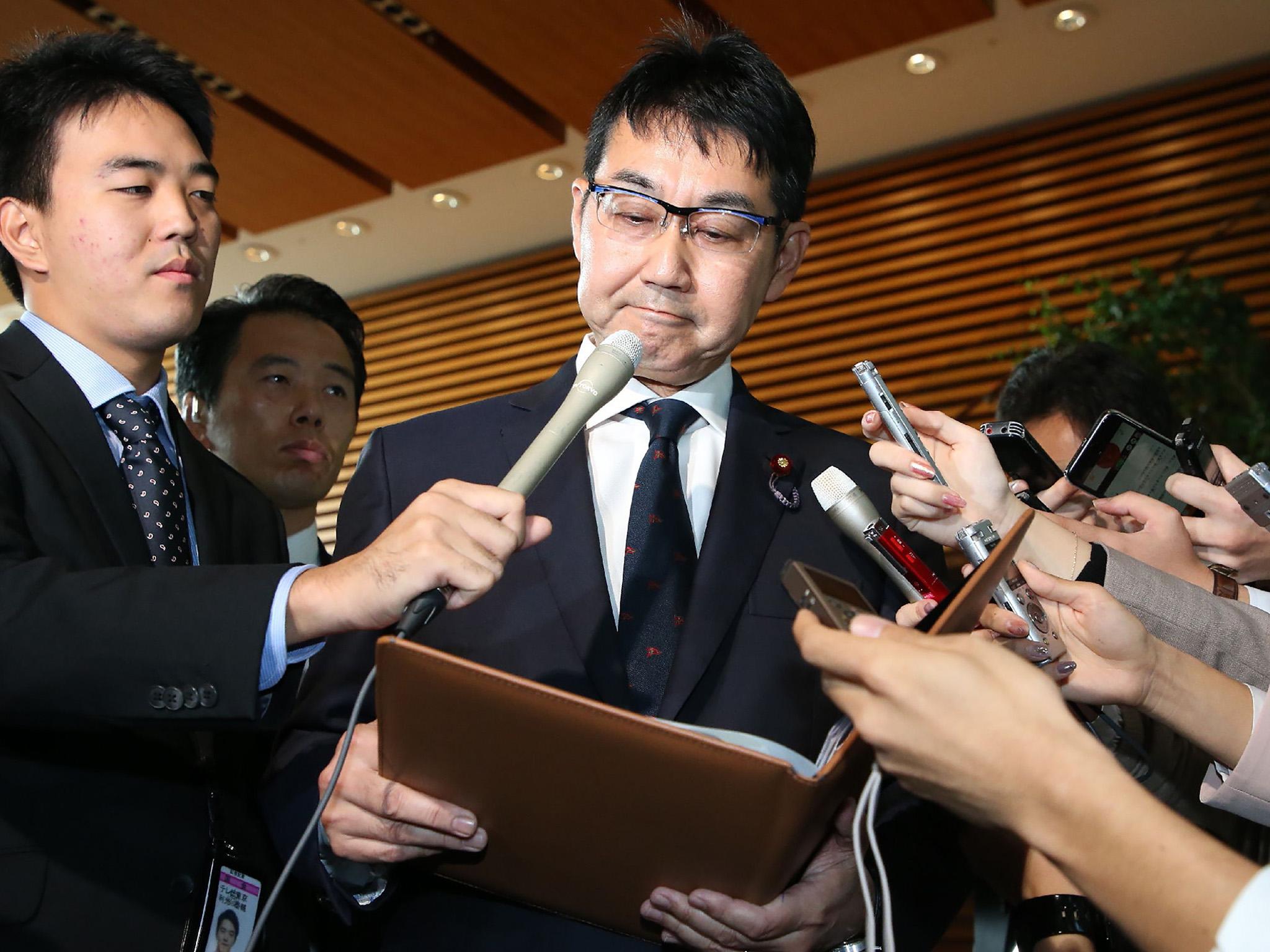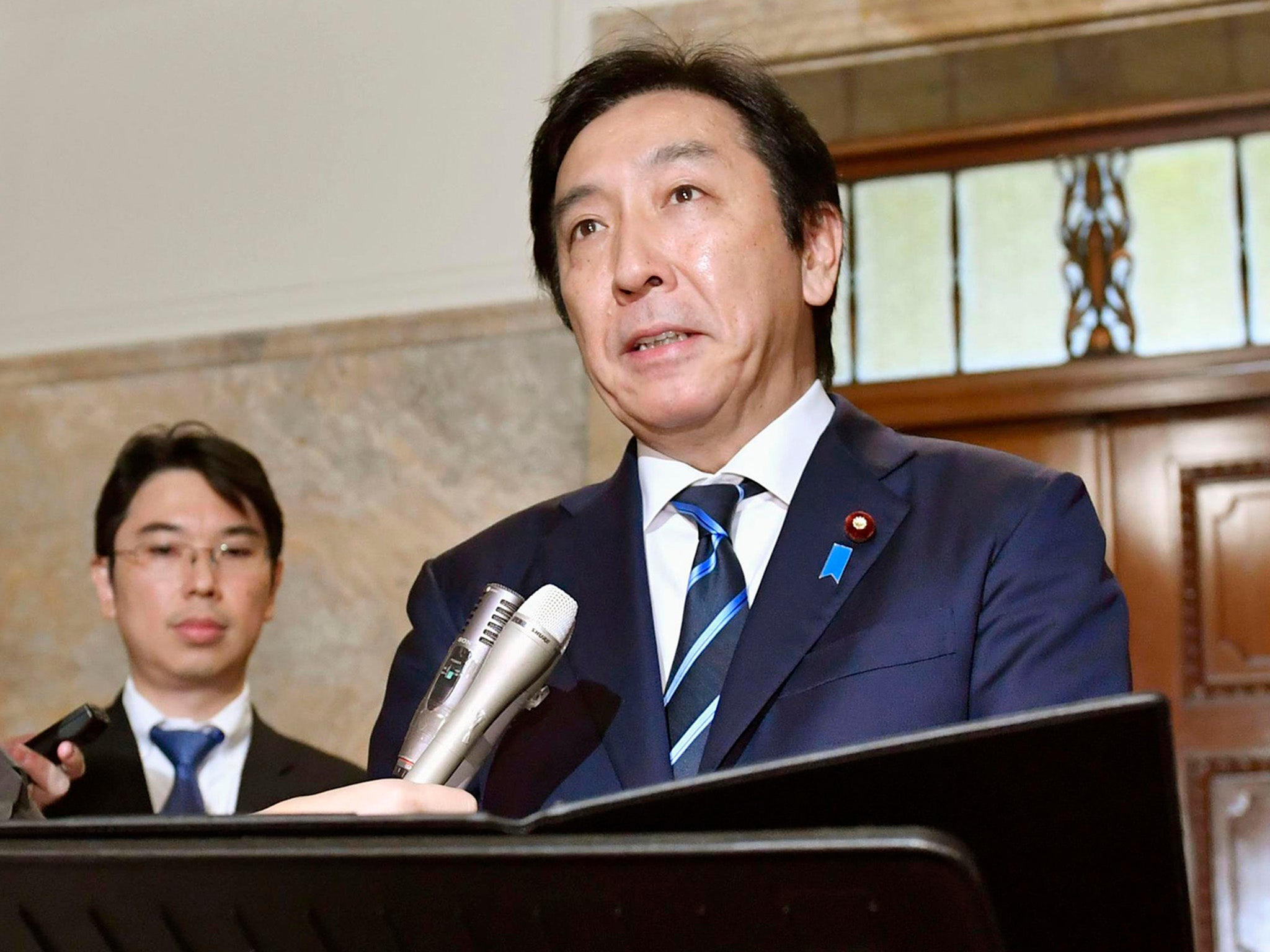Two Japanese cabinet ministers brought down by melons and potatoes
Strict rules on political gifts force two senior politicians out of office within a week

Your support helps us to tell the story
From reproductive rights to climate change to Big Tech, The Independent is on the ground when the story is developing. Whether it's investigating the financials of Elon Musk's pro-Trump PAC or producing our latest documentary, 'The A Word', which shines a light on the American women fighting for reproductive rights, we know how important it is to parse out the facts from the messaging.
At such a critical moment in US history, we need reporters on the ground. Your donation allows us to keep sending journalists to speak to both sides of the story.
The Independent is trusted by Americans across the entire political spectrum. And unlike many other quality news outlets, we choose not to lock Americans out of our reporting and analysis with paywalls. We believe quality journalism should be available to everyone, paid for by those who can afford it.
Your support makes all the difference.Japan has a low tolerance for anything with a whiff of political bribery. But a pair of recent scandals prove that stacks of cash need not be involved. The line can be crossed even with fruits and vegetables.
Two ministers in the cabinet of Prime Minister Shinzo Abe have resigned in the past week, less than two months into their tenures, after they were accused of the less-than-monumental offence of giving produce to voters.
The first to go was Isshu Sugawara, the trade minister, who was accused of sending cantaloupes and crab – luxury items that can be quite expensive in Japan – to constituents, as well as improperly paying about $185 (£143) as a funeral condolence gift to a voter.
Six days later, the justice minister, Katsuyuki Kawai, stepped down after a report that he had re-gifted potatoes to some constituents that he had received from a fellow politician. His wife, Anri Kawai, a candidate for Parliament, was also accused of paying double the legal limit of about $140 (£108) a day to staff members who travel in vans shouting campaign slogans.
Both revelations came in the Weekly Bunshun, a news magazine. The two ministers have not acknowledged any wrongdoing, but both stepped down quickly, they said, because they did not want investigations interfering with governing.
The swift exits indicated that Mr Abe is keeping a tight rein on anything that could destabilise his government as he is poised later this month to become the longest-serving prime minister in Japan’s history. But the departures also reflect the country’s by-the-book approach to following rules. In Japan, political gift-giving is simply not allowed.
“It is not a matter of whether it is 10,000 yen or 1 million yen,” said Hiroshi Shiratori, a professor of political science at Hosei University in Tokyo. “Even if it is 10 yen or 100 yen, it is a bit problematic for politicians to step over the rules.”
“In a sense,” Mr Shiratori said, “we are a very serious nation.”
Not only are the Japanese serious about avoiding graft, they are serious too about giving gifts. That may have been a factor in the undoing of the two ministers. Bestowing gifts is an important part of Japanese culture.
Any time employees or family members go on a trip, no matter how brief, they are expected to bring back souvenirs known as omiyage. Guests never arrive empty-handed. Companies give midyear and year-end gifts (ochugen and oseibo) to clients. And the custom of bringing money to a funeral helps families defray costs; small tokens like tea or dried seaweed are usually offered in return.
Japan’s establishment has enforced the strict rules on political gift-giving ever since notorious multimillion-dollar scandals rocked Japan in the 1970s and ’80s. The rules, which include precise limits on compensation for campaign staff members, are intended to prevent the wealthy from gaining an unfair advantage in politics.
Decades ago, though, the scandals were more about companies making huge payments to politicians. The former Prime Minister Kakuei Tanaka was found guilty in 1983 of accepting bribes then worth about $2.1m (£1.6m) to arrange the purchase of Lockheed aircraft by All Nippon Airways.
Another scandal involving corruption by political and business leaders and a real estate firm called Recruit Cosmo shook the establishment in the early 1990s.
But some wonder if the cut-and-dried approach of today misses the point.

“I think this has to do with the Japanese way of obsessively following the rules while refusing to see the bigger picture and problems behind them,” said Yujin Yaguchi, a professor of American studies at the University of Tokyo.
Still, others said the strict adherence to campaign finance laws was a positive contrast to places like the United States.
“I think it’s a healthy sign for Japanese democracy that the government feels that even what we might see as relatively minor infractions of campaign finance rules is taken very seriously and results in the resignation of top ministers,” said Phillip Lipscy, director of the Centre for the Study of Global Japan at the University of Toronto.
“It’s very different from the US, where government officials are able to dig in and get through what appear to be much more serious accusations of influence peddling and corruption,” he added.
Not every Japanese politician hits the exit at the first suggestion of wrongdoing, though. Mr Abe himself has hung on to power through several influence-peddling scandals that threatened his political standing last year.
After a brief, scandal-ridden stint as prime minister from 2006 to 2007, he returned to power in 2012. Analysts said he may have learned from his first shot at power how to cut his losses.
“Deprive the scandal of oxygen,” said Tobias Harris, an expert on Japanese politics at Teneo Intelligence in Washington, and “don’t give the opposition the opportunity to hijack the proceedings.”
This week’s resignations have a precedent under Mr Abe. In 2014, Yuko Obuchi, then the economics minister, resigned after giving voters wine and discounted tickets to Kabuki theatre performances. (She was also found guilty of failing to report about $241,000 (£186,000) in fundraising.)
Also that year, Midori Matsushima, then the justice minister, resigned after handing out to voters paper fans embossed with her name.
There have been second acts, however.
Itsunori Onodera resigned as a member of Parliament in 2000 after he was found guilty of violating the public election law when his secretary offered voters boxes of incense with his name on them. After Mr Onodera won back his seat, Mr Abe appointed him defence minister both in 2012 and again in 2017.
“Voters forgive candidates after they make an apology,” said Yukiko Miki, chair of the nonprofit organisation Access-Info Clearing House Japan, which advocates more transparency in government. “They rather put a priority on what a candidate would do for them.”
The New York Times
Join our commenting forum
Join thought-provoking conversations, follow other Independent readers and see their replies
Comments